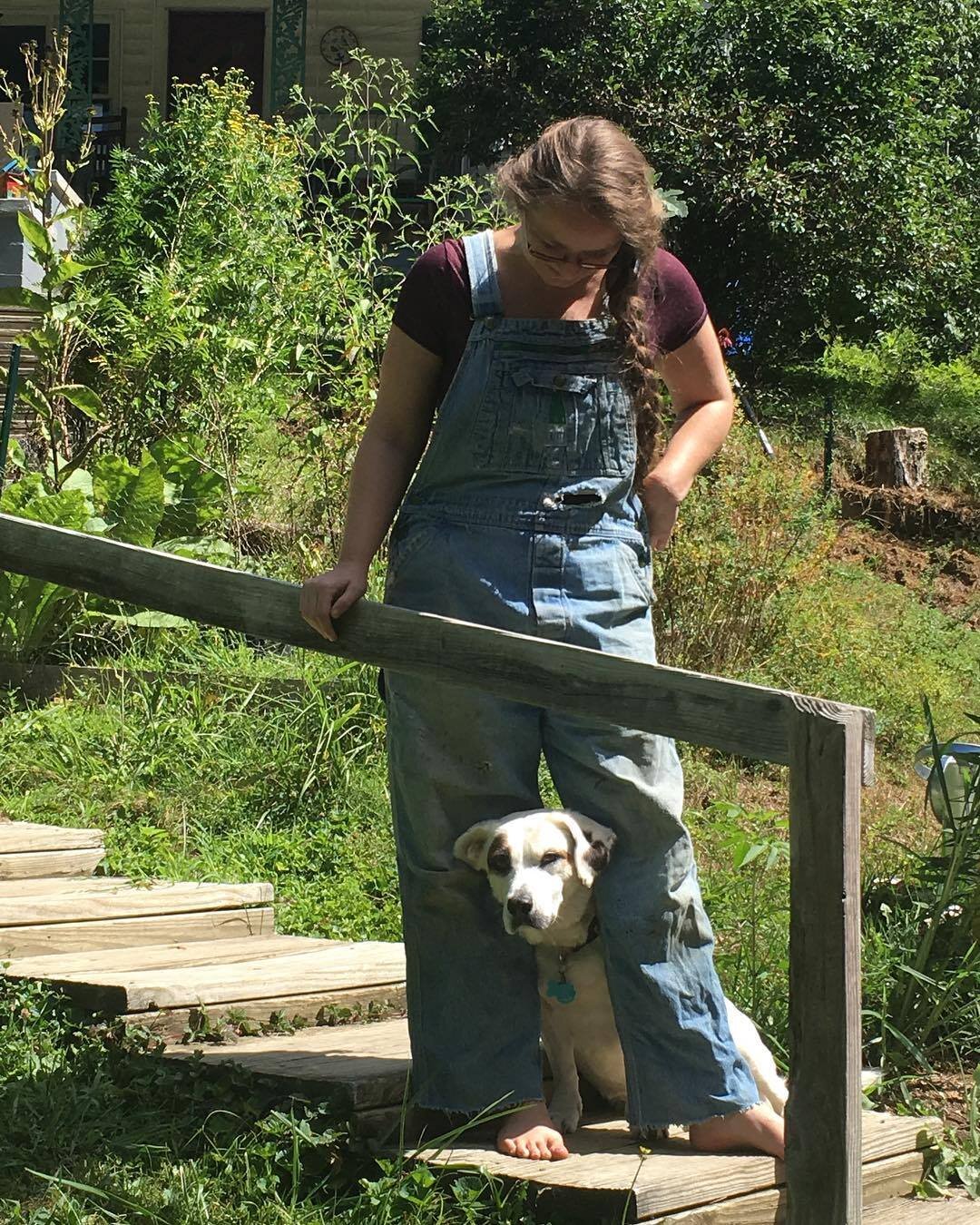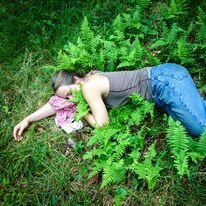Rashod wearing a shirt with the words “Legalize Trans*” written across the front.
Rashod Xavier Brown is an artivist, organizer, dog parent to Rain and Thunder, and dynamic leader in Pittsburgh’s LGBTQ community. “I love making art. And I love helping people. Put those two together and it’s a win-win situation for me,” Rashod told us. His love of making art was apparent as he showed us around his apartment full of projects in various states of creation, and his love for his community and of caring for his people was just as abounding. He stays consistently very busy working with a number of Pittsburgh based organizations including Project Silk, a project of Pittsburgh’s Community Health Services (CHS), TransYOUniting, Garden of Peace, Initiative for Transgender Leadership (ITL) and Action Housing.
Rashod is always in the midst of many projects, and in the time he spent with us he shared about a few. In collaboration with folks at CHS, Rashod is currently in the process of developing a training and curriculum to teach transgender medical competency in hospitals across the city. In Pittsburgh, and across the country and world, the medical-industrial complex has long been a space that has targeted, pathologized, and abused LGBTQ people, trans people, and Black and Brown trans people in particular. Rashod’s development of this crucial intervention points to his deep commitment to caring for and ensuring the safety of his folks.
“The way I view it is that this needs to happen cause it’s like 2021, right? And you have all these rights, and non-discrimination, right? And still to this day everybody is seeing gender as black and white, when it’s really shades of the rainbow. So it just baffles me… It angers me to my core. And I just want to go in there yelling at them, but I know that’s not going to do anything, so you have to come at it with, not even a point of understanding, but level headedness.”
Rashod emphasizes the profound influence that his transition had on his outlook on the world and on the work he does. “Living my life in my truth, I saw that there’s really a disconnect within the community toward trans people. And it opened up a new world, because I did not see this, of course, because I didn’t come out, right? So, I didn’t see it at all, until I did and I was just like, “wow, something needs to get done about this.” In addition to his leadership work, his transition also shifted his relationship to his creative work. “I remember starting off I went to The Art Institute of Pittsburgh just wanting to become a special effects makeup artist, make all these mechanical masks and stuff like that, and it really shifted when I started transitioning.” From his dreamy and playful work to pieces that explore his identity and politics, Rashod uses his artistic process as a practice of understanding and communicating with and about himself. “Art, for me, it’s the process of healing, of getting my feelings out, of really connecting to myself.”
“I have art everywhere in my house,” he told us as he showed us the projects covering every corner of his work table, his dining table, and, surprisingly, his art table, too. “From there to over there is just filled with art and I personally love it because I can make art when I want, and obviously where I want in my house.” Working in multiple and mixed mediums from painting and sculpting to his latest work of building and designing fully-furnished miniatures, Rashod’s work investigates varied themes and he prefers his pieces to stay open to interpretation. “I want you to tell me what you see, what you feel, how it makes you feel, and then we can talk about that. [...] If it aligns with what I envisioned then I know I’m doing a good job.”
On top of his creative work, Rashod has deepened his commitment to the Pittsburgh trans community and broader LGBTQ community in multiple arenas. Whether it’s his education and advocacy in healthcare spaces with Project Silk, his work in the realm of cultural and healing work with Garden of Peace, or marching in the streets with TransYOUniting, Rashod continues to show up for his community, even as his feelings about this place, about his home, are so complex and painful.
“First and foremost, I actually have so many negative feelings toward Pittsburgh and this much positive, but that much is what keeps me here. Pittsburgh for me is home, but it’s like a home that your parents kicked you out of when you was younger and they don’t want you back, but since they're your legal guardians they’re gonna take care of you and it’s the only place you got. That’s what I feel when I think about Pittsburgh. Like I have friends here who I love, I have family here who I love, but in order for me to grow more [...] I have to move but Pittsburgh doesn’t want that. Pittsburgh’s like ‘but there’s still so much work you could still do,’ and I’m like ‘ugh.’”
This feeling and relationship to home may be familiar to many folks in Pittsburgh and across Appalachia, particularly Black folks and queer and trans folks living across the region: holding a deep love for the gifts of this place, fighting for this place and its people, yet continually being told, actively or passively, that this place doesn’t want you. That complexity and heartache that so many feel for our communities is real and difficult and complicated, and that heartache has the potential to bring us together, too. Rashod reflected on the life-affirming experiences he has had building a community and home in the city that celebrates and centers the wisdom and power of Black queer and trans people.
“I want to talk about my favorite of all time event which is BTR and that stands for Black Trans Revolution. It was a weekend, I think a little bit more than a weekend long healing retreat. You had all of these trans people from all around—so you had Pittsburgh, Ohio, New York, Philly, New Orleans—trans people from all over came to Pittsburgh. TWOCC which is Trans Women of Color Collective and Garden of Peace teamed up and created healing circles. We actually did a lot of healing circles because we found out that being a trans person, you’re always on the defensive, you are always fighting with everyone to be yourself, So, you cannot just move on from that, you have to heal. And that’s what every place, they’re like ‘oh, let’s create something trans and then they can shut up and it’ll be alright cause they have something now.’ No, you have to create spaces for trans people to talk about their pain and trauma, then heal from it. Cause if you don’t have that healing piece in there then what are you even doing? They’re not going anywhere, So we had that healing piece. And, I kid you not, every single person that went to BTR came out, like, 10,000 times better. Not only did we get the chance to heal, we got family.”
“BTR has changed my life. It has changed my other family’s lives that I have talked to. I cannot praise BTR enough. I feel like every year there should be a BTR for the new coming, younger trans people.” Rashod recognizes with deep gratitude the ways that Garden of Peace and the mentorship and support of the founder Michael David Battle has shifted his own trajectory. “Michael has done so much stuff for me. He started me in the process of getting hormones and he helped me get my name changed. Like, when I was homeless for a while he actually housed me and basically taught me everything he knows.”
Rashod imagines a future rooted in the principles he has inherited from Michael and so many others; a community beyond the oppression of Black, brown, LGBT, and poor people. “The end of that struggle is when my work is done and I can just rest. And that is like the perfect, that’s my heaven right there.” Rashod envisions a home where he is surrounded by loved ones, family and chosen kindred, who are committed to caring for one another deeply and holistically. “Family, crops to live off of, basically sustaining ourselves. [...] That’s home for me. And a whole bunch of African print. And my ancestors. That’s home.
Recalling an image of a tree with peeling bark, Rashod left us with a beautiful, and tragic, and hopeful metaphor. “I view that tree as a trans person because anybody any day can come up to that tree and peel a layer off that tree and the tree can’t do anything about it, right? So, that tree in my mind is a trans person who can’t move and feels hopeless because you have all these outside people, organizations, society, that comes up and just keeps peeling away all these layers until this tree is bare, and then what? So in my mind I’m like, you have this bare tree that has no more layers for society to peel so society is either going to chop it down or leave it alone to die. So, what I am here to do, I am going to take a picture of that tree then make it my mission to feed that tree, to make sure that tree is nurtured, to basically grow that tree into whatever that tree wants to become, right?”
To learn more and support Rashod’s work you can follow him on Facebook at RXB Creations, check out www.gardenofpeaceproject.org/, or support him via CashApp: $KingRah90, Venmo: @King_Rah90, or PayPal: @RashodX.














